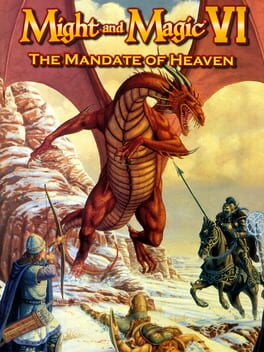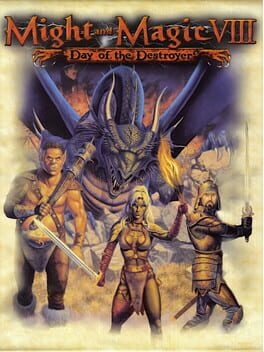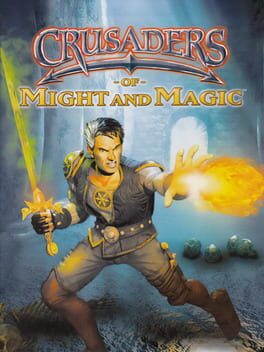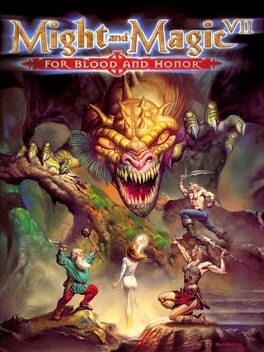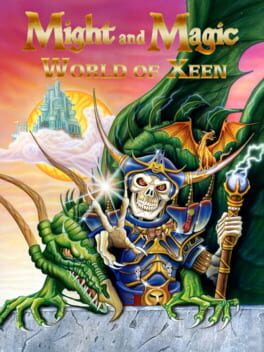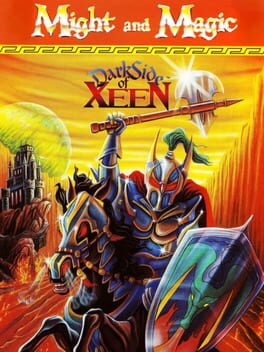

The Ironfist Dynasty is tottering on the brink of ruin. As endless calamities plague the kingdom of Enroth, evil doomsday cultists plan to overthrow child Prince Nicolai and claim the throne for their charismatic leader. Fear grips the land and the people wonder if their sovereign has lost the Mandate of Heaven - the divine right to rule. The enemies of reason are at the gate and only extraordinary heroes can stem the tide of darkness. Will you answer the call? From the depths of the deepest dungeons, to the intrigues of the royal court, you will lead a band of adventurers on a dangerous journey of amazing depth and intelligence. With a completely new 3D graphics engine and a non-linear adventure system, Might and Magic VI: The Mandate of Heaven brings a unique role-playing experience to life.
Also in series
Reviews View More
still a great game, been playing with the World of Enroth mod that, among other things, modernises the controls and resolution to be playable today.
Regardless, Might and Magic VI is a very neat game. I don't play a lot of CRPGs, but I've been sick and not feeling up to something overly actiony or untranslated, and Might and Magic VI is a game I dabbled with lightly at release and always wanted to go back to and play for real. I grew up with Might and Magic 2: Gates to another World on Sega Genesis, and finally got around to beating that a few years back, so it's been fun to finally get around to seeing how the series evolved into its first 3D release. (Full disclosure: I played on a Windows 10 PC with the Grayface mod with mouselook enabled.)
While the game is more accessible in some ways than its early predecessors – the map, and auto-mapper are enabled by default, instead of hidden behind spells and skills learned from NPCs – there were some elements lost along the way. In particular, the loss of choosing a party character's race is very unfortunate, although I understand that came back in later releases. And the game can still be downright obtuse when it wants to be. Navigating labyrinthian dungeons is expected in the genre, but in this game navigating town maps is perhaps even more challenging. The in-game map will not show you where important stores or NPC skill trainers are, and some towns – like Free Haven – are so sprawling that even using one of the handy town maps online which was designed by fans in the late 90s, you might still have difficulty finding where it is you're going.
The game is challenging, but not so bad once you realize it just wants you to play by its rules. Early game is dominated by bows, mid to late game by spells, and the very endgame dominated by a new type of weapon you get in the final hours. Fountains and spell buffs are almost a necessity, and once you obtain the Lloyd's Beacon and Town Portal spells, you can easily maintain those buffs and mark your spot in a tough dungeon and get a quick HP/MP refill before coming back. And at higher levels you'll be doing this a lot, because you'll be blowing through a lot of MP, and healing spells are pretty terrible.
That's not to say that a Cleric is useless. I used a Knight/Cleric/Sorcerer/Sorcerer party, but honestly, it was the Knight that felt like a wasted slot for most of the game. In the very early game melee classes like Knight are useful because they don't die after two hits and magic is kind of weak and/or costly at first. But by mid-game, classes like Knight can't keep up with the damage output of spellcasters, and by the time you unlock Dark and Light magic – giving access to the most powerful spells in the game – the only classes that matter are Cleric and Sorcerer, since they are the only two classes with access to these schools of magic. And all the HP in the world isn't going to save you if you can't take out a screen full of enemies in a timely fashion.
But how does this game play? Very well, for the most part. The game is real time, although you can enter a turn-based mode at any point. You can target enemies with spells or weapons manually, or press a button to auto-attack. A good strategy for the beginning of the game is to put some space between your characters and the enemies, then activate turn-based mode. Shoot arrows at the enemies until they get closer, insert additional space, and repeat. Dungeons are huge and full of deadly enemies and very easy-to-miss switches necessary to advance in addition to the occasional Star Trek reference. Late game when you have powerful buffs it does get a bit exhausting when you enter a room full of dozens of enemies that can instantly debuff your characters by looking at them, while your array of debuffs are almost entirely worthless. But overcoming those challenges and heading back to towns and leveling up feels very good.
Towns are full of wandering NPCs, who can be chatted up for lore or valuable game info or recruited as hirelings. NPCs in houses can also be recruited, or help you unlock new levels of skills through Expert and Master training, although keeping track of where those skill trainers live can be a bit of a headache.
And skills are a huge part of the game. Every level you gain HP and MP, as well as skill points which you can then put into a variety of skills you can learn. How effective you are with different weapons, armor, various schools of magic, and other abilities, is directly impacted by your level in these skills. This leads to a tremendous level of customization, and can mean the difference between smooth dungeon crawling and a tough time, and lends more replayability to the game.
Other customization involves portraits. You have the choice of several presets to choose from for your 4 party members, and each portrait has its own expressions, voices, and general attitude. Eyes and mouths shift as you play, and different status effects will cause them to make different ridiculous faces, which is always fun to see. These portrait options also add to replayability, although I can't imagine not choosing Johnny Depp, Xena, and “I'm the one you want!” every time.
As for the game's weaknesses, the biggest has to be the story elements. They suffice, but that's about it. You're not going to get attached to characters and be shocked by their actions – although that's not to say there aren't a few twists in there – in fact, you'll probably struggle to remember most people's names. Going into this game expecting a masterpiece of storytelling is a mistake.
But this isn't a game you play for the story, it's a game you play for the dungeon crawling. It's a game about exploring a beautiful low-res fantasy world and killing anything that stands in your way. Get a mission from an NPC, hit a dungeon looking for something to retrieve for that NPC, hit a few switches or enter a code along the way, collect the loot, and murder anything that moves while you're at it. It's a number-go-up game. Bigger stats, more powerful spells, more powerful attacks, more loot, more coins, more XP, more corpses. What more could you want in a dungeon crawler? Good music? Although somewhat limited, it has that too. Very good, atmospheric stuff.
In short, if you're looking for a good time with some bad enemies in some big dungeons, and are partial to the digitized low-res late 90s low poly aesthetic, check it out.
